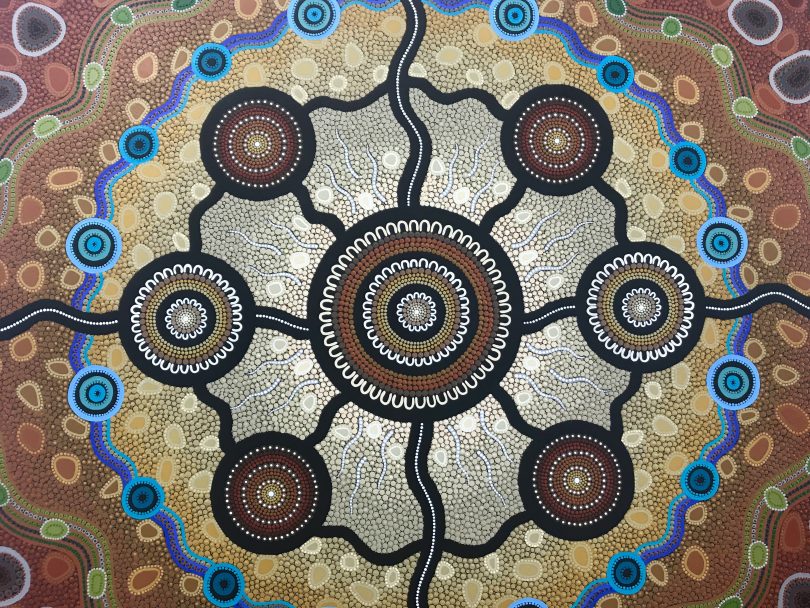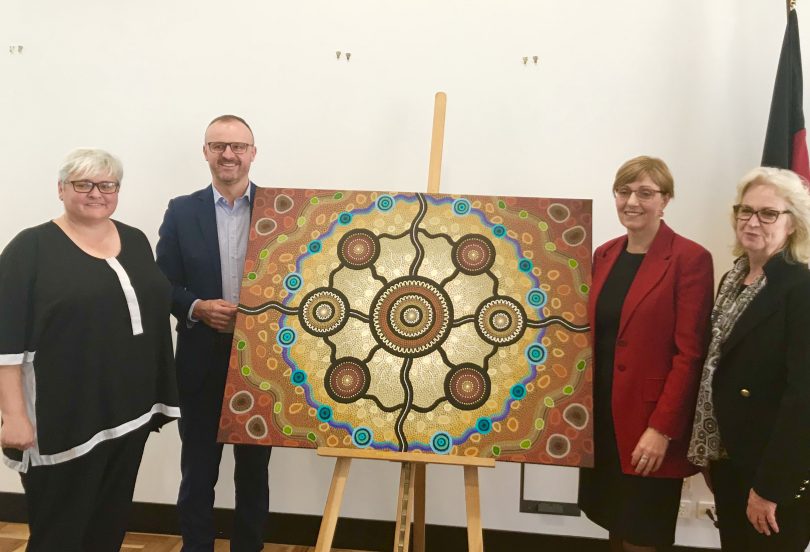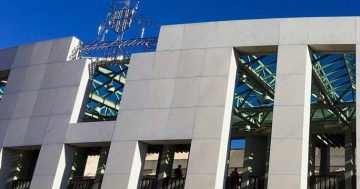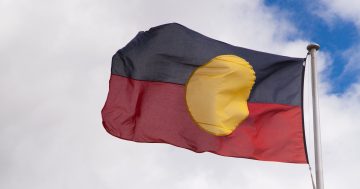
Strength in Community, by Canberra artist and Gamilaroi woman Leah Brideson was commissioned to commemorate the agreement signing. Photos: G Jacobs.
Canberra’s Aboriginal and Torres Strait Islander community has signed a new ten-year formal Agreement with the ACT Government, but community leaders say that while the formal agreement is a good indicator of progress, there are plenty of reasons to continue asking the government hard questions.
Minister for Aboriginal and Torres Strait Islander affairs Rachel Stephen-Smith said that the ACT is unique in having a voice to government and the Assembly from an elected body, but that the Agreement between the two is also a tool to hold the government to account on Aboriginal wellbeing and self-determination for its term, due to expire in 2028.

Katrina Fanning, chair of the Aboriginal and Torres Strait Islander elected body, chief minister Andrew Barr, Minister for Aboriginal and Torres Strait Islander Affairs, Rachel Stephen-Smith and Head of the ACT Public Service, Kathy Leigh with the agreement commemorative artwork.
Katrina Fanning, who chairs the Aboriginal and Torres Strait Islander elected body says the government can’t rest on its laurels, but needs to ask “To what level have they engaged and been directed by Aboriginal and Torres Strait Islander people? In what ways have they developed and supported our solutions rather than imposing a pre-cooked option?
“And most importantly is this having an impact on the people who need it the most? Aboriginal kids in particular need to have every opportunity that any of the kids they go to school with or live next door to take for granted.”
Fanning agrees that the rates of Aboriginal imprisonment rate at the AMC and removal rates for Aboriginal children show “exactly why we need to do things differently so that Aboriginal people drive the solutions, not just bear the impact of them.
“We need more service organisations, to build on the ones that exist, and to value early intervention and a strength-based approach rather than just intervening at the really hard end of things when it’s often very hard to do anything meaningful,” she said.
Minister Stephen-Smith said the Agreement process was the result of significant work with the local elected body and that the government must work together with local people on implementation. Self-determination and strong families were the key themes underlining the Agreement. “Aboriginal and Torres Strait Islander people have the answers and it is up to us to listen to them and act with them,” she said.
The four core focus areas for the agreement are children and young people, cultural integrity, inclusive community and community leadership. The Agreement outlines how the ACT Government, the Aboriginal and Torres Strait Islander community and non-government partners will work together to meet the social, cultural and economic needs of Aboriginal and Torres Strait Islander people.
Gamilaroi woman and Canberra artist Leah Brideson was commissioned to make an artwork commemorating the signing, titled Strength in Community.
“The central circle is our people, our mob coming together as a community and working to build a strong connection with culture and families, building that strength,” she said. “The design also represents the landscape we have here, so rich with so many stories within this place that are waiting to be told.”
While Katrina Fanning is hopeful about the work her community has done with the government, she also knows that the issues are generations deep and sometimes exceptionally difficult to fix. “People are living through the statistics we’re talking about. We need to let Aboriginal and Torres Strait Islander people run the race they want to, empower them and their communities.
“It’s not just about fixing the situation for the most vulnerable but giving everyone the chance to be the role models, rather than be reliant on others to do it for us.”
The Agreement is available on the Strong Families portal here: https://www.strongfamilies.act.gov.au/home



















